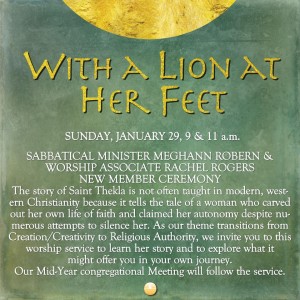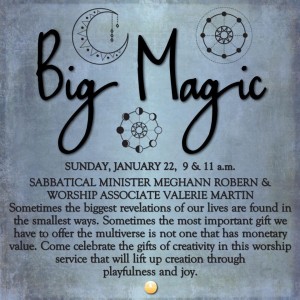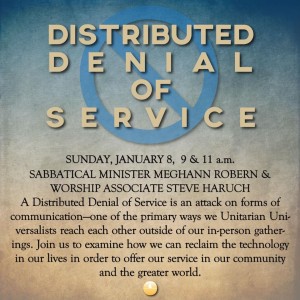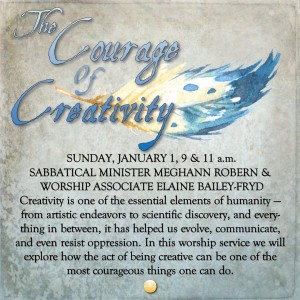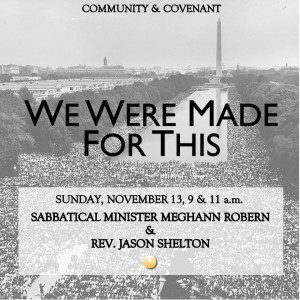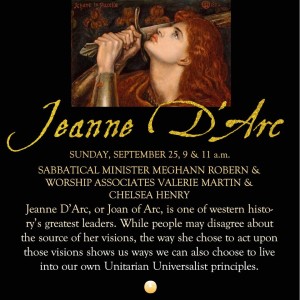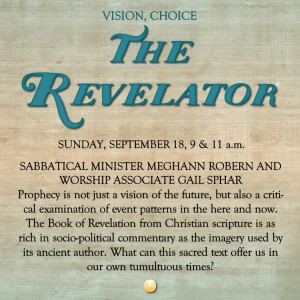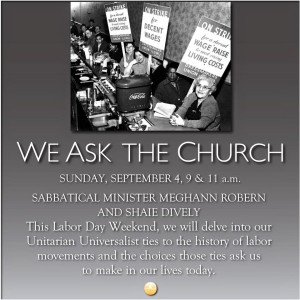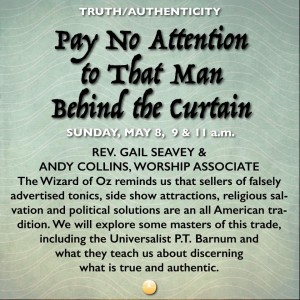Watch and listen to the sermon on Facebook:
One of the things you’re taught when you’re training to be a religious leader, no matter which faith tradition you call your own, is to figure out what spiritual practices nourish you so you can serve others, and to try to always find inspiration and connection in your daily life, not just on Sundays. As Unitarian Universalists, I think these are important things for all people to develop in their lives, not just the clergy. It’s part of my work here with you to help you on your individual spiritual paths, and to help you build a covenanted, beloved community.
We do this by expressing our shared values through our seven principles, and exploring the six sources of our faith. Today in particular, I’d like to share an example from a source that we Unitarian Universalists describe as “direct experience of the transcending mystery and wonder”. It comes from a friend of mine, an Episcopal priest named Jana, who serves the communities of Southern California in the United States. We went to seminary together, and soon became good friends. We were both women in traditions historically dominated by men in the clergy–this congregation being an exception, of course. We both were finding our way through graduate school and credentialling requirements while being married and co-parenting. We both had sardonic, sarcastic senses of humour that sometimes got us in trouble.
One thing we didn’t have in common, however, is a love of hiking. As many of you found out last weekend on the church camping trip, while my partner, Josh, made the rank of Eagle Scout in the Boy Scouts of America, I am Troop Beverly Hills. I enjoy camping, but I have my limits. For Jana, however, deep trail hiking and camping is not just time she devotes to her self-care and bonding time with her family, but it is also a spiritual practice in the same way that running — or in my case, wogging — is for me.
For a class project, Jana shared with us one of the most important spiritual lessons that she had learned from these endeavours, while preparing to hike the John Muir Trail. This trail is famous, even outside of hiking and camping communities. It runs 338 kilometres from the Yosemite Valley to the peak of Mount Whitney, and then you have to do another 17 kilometres to get from the official end of the trail down the mountain. The elevation gain is 14,000 kilometres. It’s called the backbone of the High Sierra. While parts of it are accessible even to the likes of me, hiking its length takes multiple days, ventures through deep wilderness, and is not for the unprepared.
What Jana taught us for this class project, and I’ve carried with me as an essential tool in the spiritual kit since then, is the concept of shaking out your gear. Before you actually go up on the trail, committing to hundreds of kilometres and several days in the wilderness, you do test runs. You pack up with the stuff you *think* you will need, and go out for a test hike somewhere less dangerous, for a shorter amount of time. And you *pay attention*.
A pack that feels fine at the beginning on day one can be dead weight by lunchtime. By the end of the day, you could have slowed down so much that had you been on the real hike, you might have run out of supplies halfway through the trail. So — you go through all the things you brought with you. Be ruthless. What do you *really* need, and what can you leave at home? What might useful for another situation, but not this one? What can you get rid of entirely? What can be shared among the group instead of each person carrying their own?
What I’d like you to consider is how what we did this morning, cleaning out my bag, might be helpful in our internal work. So much of our culture is about perfection, and about getting rid of the parts of us we don’t like. Pretending they don’t exist and never did. The problem with that is it causes erasure. It prevents wholeness, it prevents integration between our minds, bodies, and spirits, and it keeps us from living into our full potential.
One of the key components in the definition of trauma and its side effects is the inability to create a narrative out of one’s experiences. Things that we have experienced are kept in our memory banks isolated from everything else, with no connection to things before or after. In extreme trauma, the memories are imprinted on the brain without even a stamp or time or place for filing, which is what leads to flashback experiences for those living with post-traumatic stress disorder. With PTSD, our brains have no system to file these memories of trauma in the archive, so they keep coming back as a present-day experience. Therapy and other treatments help the brain assign traumatic memories a place in the past, so they can be examined with some distance, and integrated in a personal psychological narrative.
That’s a lots of psychological terminology to say that we as human beings are hard-wired to tell stories. We tell our own story to define who we are. We tell stories in groups to teach each other what it means to human, and to be in a particularly community. Multicultural understanding comes when we learn stories not our own. For Unitarian Universalists, stories are the bedrock of our tradition — our stories help us journey on our personal spiritual paths, and our stories guide us in how to be together and live into the covenants of community we make with each other. Stories allow us to be flexible and responsive, and to always be learning and evolving and adapting, instead of being tied to creeds or doctrines.
Some stuff that comes out of our bag is stuff we need to get rid of. The ways we’ve been cultured to allow -isms into our culture, to become entrenched in our systems. It’s the protein bar that fell to the bottom of the bag, broke open, and melted over everything else, including the inside of your bag. It’s permeated, and gonna take a lot of time and effort to get it out. Might even take more than a few attempts. But knowing it’s there is so much better than ignoring it and letting it mess up everything else in your bag. Pretending it was never in the bag prevents you from actually being able to use the bag.
And so it is with all the stuff that makes us who we are — our flaws and faults as well as our talents and shining abilities.
I’m someone who likes being prepared. I have multiple backup plans for any given situation. My lists have lists, and sometimes all my lists are catalogued in a spreadsheet. Organizing my resources into easily accessible forms is soothing for me. It helps me work through anxiety and fear about the unknown. And these are skills that someone in my position should have, as a sole minister of a mid-size congregation. But what this also tells me about myself is that I like to be in control. I like consistency, reliability. Many years ago, before a lot of therapy and spiritual direction, I would allow my need for control and planning as a comfort mechanism to interfere with my ability to be person in relationship with others.
What I’ve learned from my spiritual work with shaking out my gear is that while making all these lists and plans are helpful for me, to help me assess and process what happening in my life — sometimes to actually live I need to throw out the lists. To truly be in community I need to be disrupted by the needs of those around me. To acknowledge that it’s not all about me, to check my own selfishness and self-absorption, I need to be willing to ask — what would be helpful for you right now?
Even more importantly, I know that this tendency of mine is part of who I am. It is not something I can simply pretend doesn’t exist. What I *can* do is recognize it for what it is, and spend intentional time figuring out how it is helpful, and how does it hinder? When I “shake out my gear”, is it something I need to leave behind for this excursion in the wilderness? Or is it something I can use to help all of us get to the end of this particular adventure?
And shaking out our gear is not a one time operation. Especially as Unitarian Universalists, who have built adaptation, growth, and learning into the fundamental values of our tradition, we should always be willing to examine our ways of being — on both the personal and communal level — to see what work needs to be done. What has had its time, and can be shifted into fertilizing our roots? What new innovations are before us, to give us wings? How can we take all of who we are, as whole yet imperfect people, and love each other so profoundly that we find ways to thrive even in the midst of maelstrom. That we find ways to share that love even in the deepest cracks where rot seeks to take root.
I leave you once again with this blessing that survived the shakeout from my ministry in Nashville to here: May our minds be open to new learning; may our lips bring truth into the world; may our hearts know love; and our hands do the work of justice; as we go our way in peace.
May it be so.
